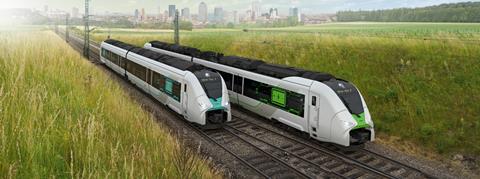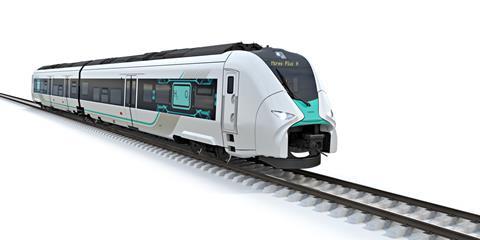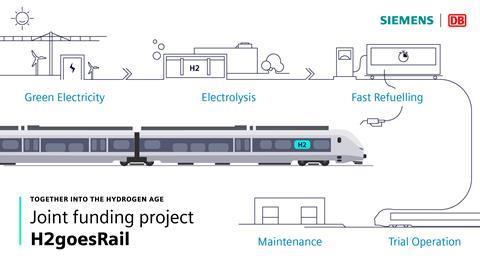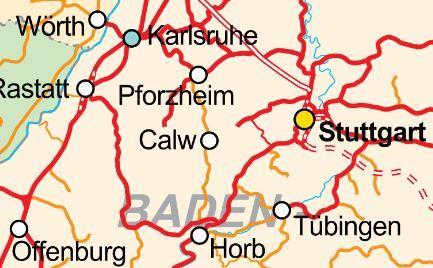
GERMANY: Deutsche Bahn and Siemens Mobility are to trial a fuel cell powered regional trainset in revenue service between Tübingen, Horb and Pforzheim in 2024, along with a green hydrogen fuelling plant.
The H2goesRail research project aims to develop and test ‘a complete system’ including both train and infrastructure.

The scheme is to be funded by the Federal Ministry of Transport & Digital Infrastructure through the National Innovation Programme for Hydrogen & Fuel Cell Technology. Additional support is coming from the Land of Baden-Württemberg, which will host the trials.
Siemens Mobility is to supply a two-car Mireo Plus H trainset derived from its Mireo Plus regional multiple-unit family, equipped with a newly developed hydrogen fuel cell drive and a lithium-ion battery.
The 1·7 MW traction power rating is expected to offer a comparable performance to the electric version, with an acceleration rate of 1·1 m/s² and a maximum speed of 160 km/h. Sufficient hydrogen will be stored onboard to give an operating range of up to 600 km, with the promoters envisaging that a three-car variant could have a range of 1 000 km.

DB will be responsible for development of the fuelling station, which is intended to allow the train to be refuelled in around 15 min, the same time as a diesel unit, minimising any impact on vehicle availability. DB Energie will produce green hydrogen using a mobile installation at the DB Regio depot in Tübingen. The hydrogen will be produced by electrolysis using traction electricity generated from renewable sources, compressed, cooled and stored in a mobile tank trailer. The mobile installation is being designed to facilitate future testing at other locations.

The promoters suggest that the topography and timetable on the Tübingen – Horb – Pforzheim route are ‘particularly suitable’ for the trials. Replacing an existing DMU, the Mireo Plus H is expected to operate 120 000 train-km in scheduled service over the course of the year, saving an estimated 330 tonnes of CO2.
The unit will be maintained and serviced in nearby Ulm, where part of the DB Regio workshop will be modified and the existing DB staff supported by Siemens Mobility.
‘Deutsche Bahn is not just a mobility company, but a technology group as well’, said management board member for Digitalization & Technology Prof Sabina Jeschke. ‘We need to bring our fossil fuel consumption down to zero. Only then can DB be climate-neutral by 2050. By that point, we won’t have a single diesel-powered train operating in our fleet.’
At present DB runs 1 300 diesel trains on its regional services, as around 40% of the 33 000 km network is not electrified.
‘Hydrogen drives are an advanced, emission-free form of propulsion that will help decarbonise rail transport and make a significant contribution toward achieving our climate targets’, added Siemens Mobility CEO Michael Peter. ‘This innovative technology will make hydrogen-powered train operations faster, more efficient and more environmentally friendly.’
Baden-Württemberg Transport Minister Winfried Hermann said it was ‘great that the first train employing this new and sustainable technology will be tested here in Baden-Württemberg. Whether powered by overhead line electricity or hydrogen, the decisive factor is that the energy comes from renewable sources.’

















